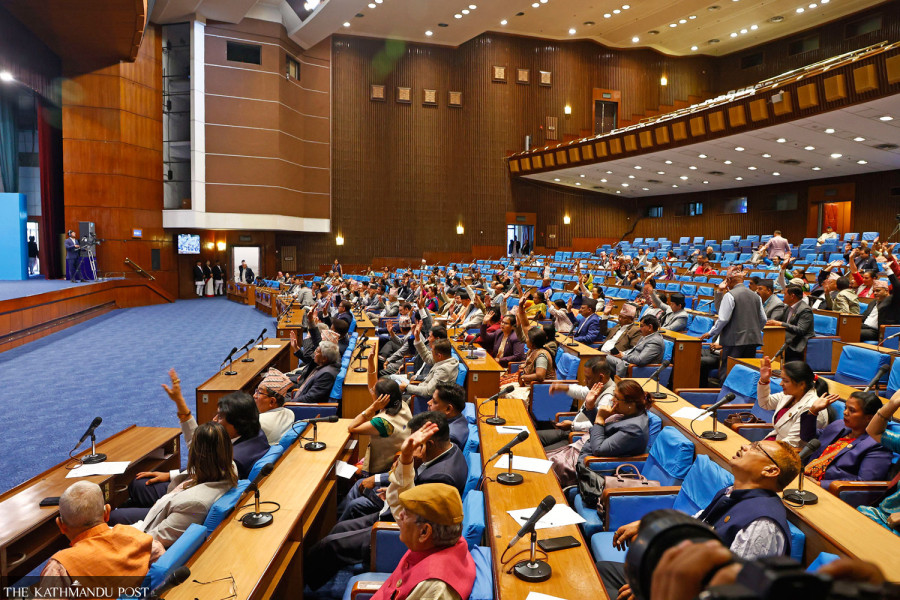Politics
Infra projects priority, focus on completion not new plans, Oli says
New policy is to review national pride projects and to complete active projects within the new fiscal year.
Post Report
Prime Minister KP Sharma Oli has told Parliament that the government has adopted a policy of giving top priority to the completion of ongoing projects instead of introducing numerous development projects without the guarantee of implementation.
He said that the government wanted to re-prioritise infrastructure projects; and end the “work-in-progress” culture and the “situation of projects being never completed” in the development sector.
“Prioritisation of the ongoing projects and continuation of the old programmes is the new feature of this year’s policies and programmes,” Prime Minister Oli said while answering lawmakers’ questions in the House of Representatives on Sunday.
He addressed questions raised by lawmakers during the deliberations on policies and programmes for the upcoming fiscal year.
The deliberations took place for a week after President Ramchandra Paudel presented the government’s policies and programmes in the joint meeting of the House of Representatives and the National Assembly on May 2.
Prime Minister Oli said that new programmes were not randomly introduced in this year's policies and programmes, unlike in the past, and claimed that the government gave continuity to old programmes introduced by previous governments.
Oli presented a list of 15 arguments to explain why new policies and programmes were not introduced in this year’s policies and programmes.
He recalled his address from July 21 last year, soon after the formation of his government, when he had vowed to bring about vital reforms in the development sector by addressing shortcomings previously characterised by the phrase “work in progress” for years.
“The framework, pace, and culture of development must change. This is a new proposal. Our commitment to implement this is also new,” Oli said. “With limited resources, we must be clear on where to invest and what result to expect.”
For experts on the economy, what the prime minister said in the House reflects the country’s reality. The government lacks the resources to make big promises, and the country’s budget currently is not even enough to cover the government’s running costs. However, while presenting the reality, experts said the prime minister also acknowledged his failure to govern.
“When frustration is rampant in the country, the government must present something that inspires hope among the people,” said Govind Raj Pokhrel, former vice-chair of the National Planning Commission. “The government missed that opportunity.”
Oli blamed the current financial constraints on previous governments, which incorporated political slogans into their policies and programmes, which in turn were difficult to implement given the resource crunch.
Even though the prime minister sounded critical of such tendencies, the UML is one such party which has generously introduced slogans into the annual policies and the budget. “Afno gaun afai banau” (develop your village by yourself” is one of its oldest while “Samriddha Nepal Sukhi Nepali” (prosperous Nepal happy Nepali) is the slogan UML leaders often repeat even today.
The prime minister added that the government was trying to correct the past flaws.
Under the declared policy of completing ongoing projects, a new policy has been introduced to review the national pride projects and to complete active projects within the new fiscal year and the term of the current House of Representatives.
“Other new policy initiatives include assessing the financial requirements for all under-construction and proposed projects, suspending those deemed unfeasible, and cancelling flawed projects,” Prime Minister Oli stressed.
Dipendra Bahadur Chhetri, a former central bank governor, also approves of this government approach. He said the same advice had been given to many previous governments.
“If the government sticks to this plan, the under-construction projects can be completed within the given time. This will have two benefits,” Chhetri said. “Once the projects get completed, no additional investments will be needed in those projects; and the projects themselves will start giving desired outputs.”
Unlike Pokhrel, Chhetri believes the government’s failure to introduce new policies and programmes won’t increase frustration among the people.
“If new projects alone were to generate hope in the people, then the 16,000 projects we have in the ‘project bank’ would have done so,” Chhetri argued.
Oli also wants to forge a new policy mandating the development of a new, comprehensive ‘business plan’ before stakeholders express interest and commit capital in new infrastructure projects.
Oli said such a plan should prioritise investors’ and lenders’ concerns, such as cash flow, risk mitigation, and legal safeguards, rather than just focus on feasibility, risks, and returns.
Further, when starting a new venture, a new policy has been proposed that emphasises the need to consider the entire business cycle—from initiation to supplying final products to the market.
After the prime minister’s answers, Speaker Devraj Ghimire tabled the policies and programmes for endorsement in the House of Representatives. Chairman Narayan Prasad Dahal did so in the National Assembly.
The policy document was passed by the majority in both chambers.
The finance minister presents a national budget for the upcoming fiscal year, guided by the same policies and programmes, on May 29.




 16.12°C Kathmandu
16.12°C Kathmandu














